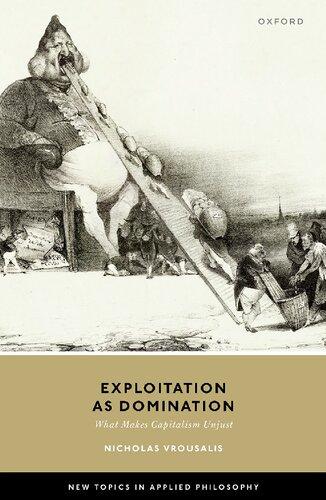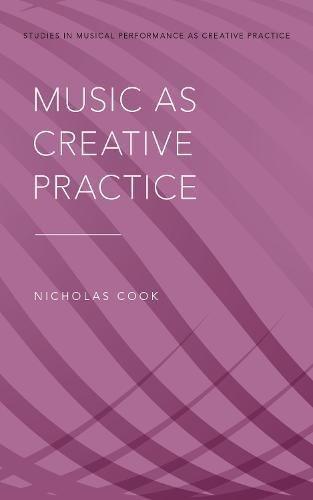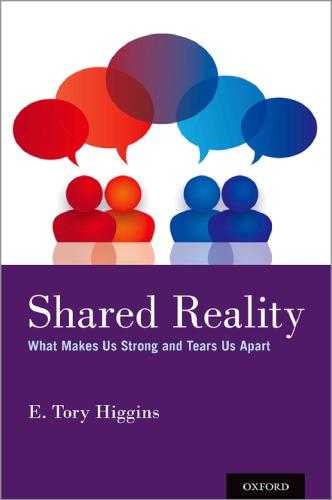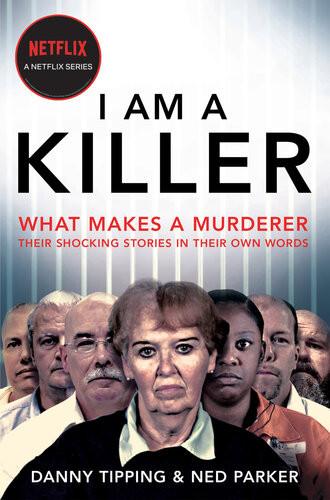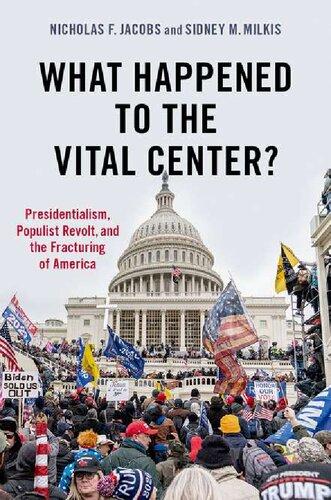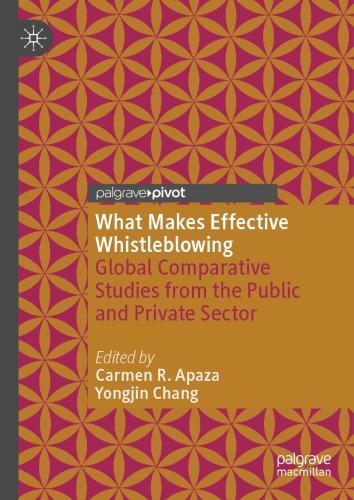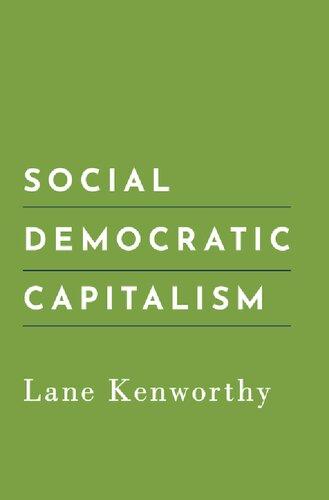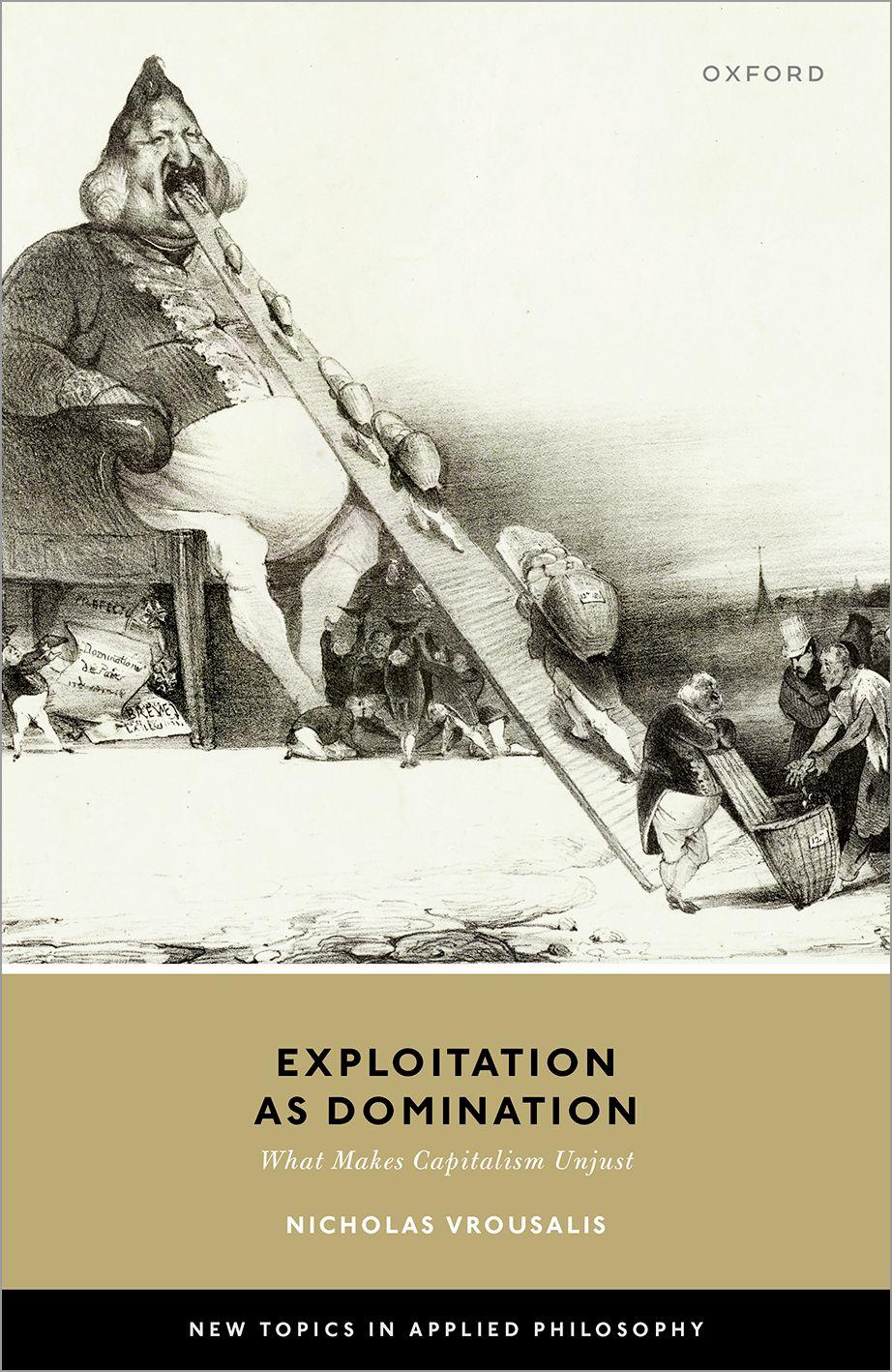Exploitation as Domination: What Makes Capitalism Unjust Nicholas Vrousalis Visit to download the full and correct content document: https://ebookmass.com/product/exploitation-as-domination-what-makes-capitalism-un just-nicholas-vrousalis/
More products digital (pdf, epub, mobi) instant download maybe you interests ...
Music as Creative Practice Nicholas Cook
https://ebookmass.com/product/music-as-creative-practicenicholas-cook/
Shared Reality: What Makes Us Strong and Tears Us Apart E Tory Higgins
https://ebookmass.com/product/shared-reality-what-makes-usstrong-and-tears-us-apart-e-tory-higgins/
I am a Killer: What makes a murderer, their shocking stories in their own words Danny Tipping
https://ebookmass.com/product/i-am-a-killer-what-makes-amurderer-their-shocking-stories-in-their-own-words-danny-tipping/
Daddy Means Domination (Bad Boy Daddies Book 4) Lucky Moon
https://ebookmass.com/product/daddy-means-domination-bad-boydaddies-book-4-lucky-moon/
What Happened to the Vital Center? Presidentialism, Populist Revolt, and the Fracturing of America Nicholas Jacobs
https://ebookmass.com/product/what-happened-to-the-vital-centerpresidentialism-populist-revolt-and-the-fracturing-of-americanicholas-jacobs/
What Lies Beneath: My life as a forensic search and rescue expert Peter Faulding
https://ebookmass.com/product/what-lies-beneath-my-life-as-aforensic-search-and-rescue-expert-peter-faulding/
What Makes Effective Whistleblowing: Global Comparative Studies From The Public And Private Sector 1st Edition Edition Carmen R. Apaza
https://ebookmass.com/product/what-makes-effectivewhistleblowing-global-comparative-studies-from-the-public-andprivate-sector-1st-edition-edition-carmen-r-apaza/
Social Democratic Capitalism Lane Kenworthy
https://ebookmass.com/product/social-democratic-capitalism-lanekenworthy/
Handbook of Petroleum Geoscience: Exploration, Characterization, and Exploitation of Hydrocarbon Reservoirs Soumyajit Mukherjee
https://ebookmass.com/product/handbook-of-petroleum-geoscienceexploration-characterization-and-exploitation-of-hydrocarbonreservoirs-soumyajit-mukherjee/
ExploitationasDomination NEWTOPICSINAPPLIEDPHILOSOPHY Serieseditor
KasperLippert-Rasmussen Thisseriespresentsworksoforiginalresearchonpracticalissuesthatarenotyetwell coveredbyphilosophy.Theaimisnotonlytopresentworkthatmeetshigh philosophicalstandardswhilebeinginformedbyagoodunderstanding ofrelevantempiricalmatters,butalsotoopenupnewareasfor philosophicalexploration.Theserieswilldemonstratethe valueandinterestofpracticalissuesforphilosophy andviceversa.
publishedintheseries
ThePoliticsofSocialCohesion
Immigration,Community,andJustice
NilsHoltug
NotInTheirName
AreCitizensCulpableForTheirStates’Actions?
HollyLawford-Smith
TheInheritanceofWealth Justice,Equality,andtheRighttoBequeath DanielHalliday
Exploitationas NICHOLASVROUSALIS GreatClarendonStreet,Oxford,OX26DP, UnitedKingdom
OxfordUniversityPressisadepartmentoftheUniversityofOxford. ItfurtherstheUniversity’sobjectiveofexcellenceinresearch,scholarship, andeducationbypublishingworldwide.Oxfordisaregisteredtrademarkof OxfordUniversityPressintheUKandincertainothercountries
©NicholasVrousalis2023
Themoralrightsoftheauthorhavebeenasserted
FirstEditionpublishedin2023
Impression:1
Allrightsreserved.Nopartofthispublicationmaybereproduced,storedin aretrievalsystem,ortransmitted,inanyformorbyanymeans,withoutthe priorpermissioninwritingofOxfordUniversityPress,orasexpresslypermitted bylaw,bylicenceorundertermsagreedwiththeappropriatereprographics rightsorganization.Enquiriesconcerningreproductionoutsidethescopeofthe aboveshouldbesenttotheRightsDepartment,OxfordUniversityPress,atthe addressabove
Youmustnotcirculatethisworkinanyotherform andyoumustimposethissameconditiononanyacquirer
PublishedintheUnitedStatesofAmericabyOxfordUniversityPress 198MadisonAvenue,NewYork,NY10016,UnitedStatesofAmerica
BritishLibraryCataloguinginPublicationData Dataavailable
LibraryofCongressControlNumber:2022939691
ISBN978–0–19–286769–8
DOI:10.1093/oso/9780192867698.001.0001
PrintedandboundintheUKby ClaysLtd,ElcografS.p.A.
LinkstothirdpartywebsitesareprovidedbyOxfordingoodfaithand forinformationonly.Oxforddisclaimsanyresponsibilityforthematerials containedinanythirdpartywebsitereferencedinthiswork.
PARTII.THEORY PARTIII.APPLICATIONS 5.CapitalistExploitation:ItsForms,Origin,andFate
PARTIV.ALTERNATIVES ListofFigureandTables ListofFigure 6.1.Whodominateswhom(fulllogicalpartition)
6.2.Whodominateswhom(instrumentalistpartition)
6.3.Modeofsurplus-extraction
Preface Thisbookarguesfortwoclaims:thatexploitationisunjustbecauseitconstitutesenrichmentthroughthedominationofothersandthatcapitalistrelations betweenconsentingadultsareinherentlyexploitativeinthatexactsense. Thisargumentexplainshowexploitersdominate,howcapitalistsexploit,and thereforehowcapitalistsdominate.Thebook’saimthroughoutistochange theconversationfromcontemporarytheoriesofexploitationwhosefocus, almostinvariably,isonharm,coercion,orunfairness.Iargue,instead,that exploitationisadistinctinjustice.So,indevelopingthedomination-based alternative,Iengageindialoguewithcompetingeconomic,social,andphilosophicaltheoriesofexploitation.
Philosophersarefamouslypronetodogmaticslumbers.Iamtherefore gratefultoRichardArnesonforawakeningmefrommine.Arneson’sgenerous andopen-mindedintelligencehastaughtmeagreatdealabouthowtodo philosophyingeneral,andpoliticalphilosophyinparticular.AlongwithG.A. Cohen,Arnesonisoneofthemostinterestinganddemandingintellectual interlocutorsI’vehad.TheinfluenceofbothArnesonandCohenis,Ithink, palpablethroughoutthisbook.
Intryingtodeciphermyownthoughtsaboutexploitation,Ihavedrawn strengthfromtheunflinchingconvictionoftwocomrades,JohnFillingand A.J.Julius.JohnsubscribedtomanyoftheideasinthisbookbeforeIcame tohavethem,whichgavemeconfidencewhenweagreed—andsometimes whenwedisagreed.I’malsogratefultoA.J.forlongperipateticdiscussionson themaintopicsdiscussedhere.I’velearnedsomuchfromhimthathebears responsibilityformanyerrorsandomissionsinthisbook!
MuchofthebookwaswrittenduringsabbaticalsatPrincetonUniversity (2015–16),whereIspenttenmonthsasaLauranceS.RockefellerVisiting Fellow,andAarhusUniversity(2018–19),whereIspenttenmonthsasa EurIAS/COFUNDFellow.IshouldliketothanktheUniversityCenterfor HumanValuesatPrincetonandtheAarhusInstituteofAdvancedStudiesfor providingacademicenvironmentsmaximallyhospitabletocuriosity-driven research.IamalsogratefultotheInstituteofPoliticalScienceatLeiden UniversityforallowingmetotaketimeoffteachingandtotheSchoolof PhilosophyatErasmusUniversityRotterdamforenthusiasticallysupporting
myresearchsinceIarrivedherein2019.TheDutchOrganizationforScientific Research(NWO)providedgenerousfundingforthisresearchaspartofits Vidigrantsscheme(016.Vidi.185.213).
SpecialthankstoAxelGosseries,EricBoot,andTimMeijersfororganizing bookmanuscriptworkshopsatAarhus,Louvain-la-Neuve,andLeiden,andto allworkshopparticipants:FritzGillerke,ManuelValente,MirjamMuller, LouisLarue,Pierre-EtienneVandamme,JulianaMesenVargas,Andreas Schmidt,BenFerguson,TitusStahl,DimitrisEfthymiou,AnneliendeDijn, PaulRaekstad,EnzoRossi,DorotheaGaedeke,SaraAmighetti,A.J.Julius, DanHalliday,DanielleWenner,andGabrielWollner.
Forhelpfulandincisivewrittencommentsonpartsofthisbook,Ishould alsoliketothank:DickArneson,LucBovens,PaulaCasal,RuthChang,Simon Cotton,AmitavaDutt,BenFerguson,MarcFleurbaey,PabloGilabert,Dan Halliday,FaikKurtulmus,AlexKirshner,NikoKolodny,BenLaurence,David Leopold,ClaudioLopez-Guerra,HarryPapadopoulos,HarryPlatanakis, CharliePost,ChristianSchemmel,GilSkillman,LucasStanczyk,Annie Stilz,RobertoVeneziani,KateVredenburgh,AndrewWilliams,StuartWhite, GabrielWollner,AllenWood,NaokiYoshihara,TamaraYugov,andMatt Zwolinski,aswellasthreeanonymousreviewersforOxfordUniversityPress.
ThisbookisdedicatedtomybelovedwifeandcomradeEfiPapadodima, whoseinexhaustiblereservesofcuriosity,courage,andgoodhumouralways fuelmine.
Thebookreworkspublishedmaterial,asfollows.Chapter1:‘Exploitation: APrimer.’ PhilosophyCompass (2018)https://doi.org/10.1111/phc3.12486 (accessed15Nov2021).Chapter2:‘Exploitation,VulnerabilityandSocial Domination.’ Philosophy&PublicAffairs 41(2013):131–157;‘Socialism Unrevised:AReplytoJohnRoemeronMarx,Exploitation,Solidarity, WorkerControl’. Philosophy&PublicAffairs 49(2021):78–109.Chapter3: ‘HowExploitersDominate.’ ReviewofSocialEconomy 77(2019):103–130; ‘ExploitationasDomination:AResponsetoArneson.’ SouthernJournal ofPhilosophy 54(2016):527–38.Chapter4:‘StructuralDominationand CollectiveAgencyintheMarket’. JournalofAppliedPhilosophy 37(2020): 40–54.Chapter5:‘CapitalwithoutWage-Labour:Marx’sModesofSubsumptionRevisited’. Economics&Philosophy 34(2018):411–438.Chapter6: ‘Imperialism,Globalization,andResistance’. GlobalJustice:Theory,Practice, Rhetoric 9(2016):69–92.Chapter7:‘PublicOwnership,WorkerControl, andtheLabourEpistocracyProblem’. ReviewofSocialEconomy 78(2020): 439–453.
Introduction Theexploitationofhumanbyhumanisagloballypervasivephenomenon. Slavery,serfdom,andthepatriarchyarepartofitslineage.Guestandsex workers,commercialsurrogacy,precariouslabourcontracts,sweatshops,and marketsinblood,vaccines,orhumanorgansarecontemporarymanifestations ofexploitationundercapitalism.
Whatmakestheseexploitativetransactionsunjust?Andiscapitalisminherentlyexploitative?Thisbookoffersanswerstothesetwoquestions.Inresponse tothefirstquestion,itarguesthatexploitationisaformofdomination, self-enrichmentthroughthedominationofothers.Onthedominationview, exploitationcomplaintsarenot,fundamentally,aboutharm,coercion,or unfairness.Rather,theyareaboutwhoserveswhomandwhy.Exploitation, inaword,isadividendofservitude:thedividendthepowerfulextract fromtheservitudeofthevulnerable.Inresponsetothesecondquestion, thebookarguesthatthisservitudeisinherenttocapitalistrelationsbetween consentingadults;capitaljustismonetarytitletocontroloverthelabour capacityofothers.Itfollowsthatcapitalism,themodeofproductionwhere capitalpredominates,isaninherentlyunjustsocialstructure.
Thischapterprecisifiesthetwotitlequestions,abouttheinjusticeof exploitationandtheexploitativenessofcapitalism,providessomeconceptual signposting,andsummarizesthemainargumentsoftherestofthisbook.
MainArgumentsoftheBook Socialcooperation,ingeneral,involvesagentsmakingclaimsoneachother’s labourcontribution.Thecopyofthebookyouarereadinginvolveshundreds ofhoursoflabourcontributionintermsofediting,typesetting,printing,and distribution,aswellasthousandsofhoursofthinkingandwritingonthepart oftheauthor.Byreadingthisbook,youconsumeashareofthenetsocial product—thevastarrayofbooks,shoes,cars,andcomputers—producedinthe worldeconomyinayear,aswellasashareofthesociallabourthatwentinto
producingit.Thatyoucanlayaclaimtothefruitsofthisvastdivisionoflabour isagiganticachievementofadvancedsocialcooperationonaglobalscale.
Thequestionthatexercisesphilosopherswhohavethoughtaboutthedivisionoflabouristhenatureandrationaljustificationofanygiven defacto claimtoalienlabour,thelabourperformanceofothers.Duringlongstretches ofhumanity’scareer,claimstotheexerciseofalienlabourcapacitywerenot typicallybasedonrationaljustification.Underslavery,feudalism,andthe patriarchy,forexample,theclaimmakerreceivesashareoftheclaimrecipient’ssurplusproduct—theproductinexcessofwhatsheneedstosubsist— bydirectlycontrollingherproductivepurposiveness.Thefeudallord,for example,directlycontrolstheserf’slabourcapacity,whichenableshimto unilaterallyappropriatehersurplusproduct.Thatclaimtotheserf’slabour performanceisbasedonthelord’smightonly.Therealizationofthatclaim thereforeconstitutesexploitation,theunilateralextractionoflabourflow throughpoweroverothers.Itfollowsthatfeudalmightmakesfeudalright,in thesensethatasuperordinate’spowerdeterminesthesubordinateproducer’s endsandworkpractices,aswellasthesocialinstitutionsthatdefineand regulatethesepractices.
ThereisoverwhelmingconsensusamongsocialhistoriansthattheEuropeanabsolutismsofthe16thand17thcenturiesoriginateinanattempt toshoreupsuchfeudalexploitationbycentralizingthepoweroflordsin thehandsofthestate.Capitalism,feudalism’ssuccessor,doesawaywith feudalmight,andtherebywithfeudalright,byinstitutingtheprimacyof contractandbyintroducingthelegalfictionofthelabourcontract.Early defendersofcapitalism,suchasMontesquieuandJamesSteuart,conceived theseinstitutionsasestablishingastableandrationalequilibriumbetween juridicalequals.Butalthoughtheywererightthatcapitalismchangesthe content ofthesubordinationrelationbetweentheproducerandherconditions ofproduction,theyfailedtonotehowitssubordinating form survivesinthe institutionsofthelabourmarket.Capitalistmightmakescapitalistright,in thesensethatitisstillasuperordinate’spowerthatdeterminesthesubordinate producer’sends,workpractices,andthedisposalofherfinalproduct.Butwhat madethischangeofcontentpossible?
Modernityushersintheideathatnohumanismorallysuperiortoany other.Itfollowsthatnoclaimtothelabourperformanceofotherscanbe rationallyjustifiedifitinvolvesmightmakingright.Therevolutionsofthe 17thand18thcenturiesthatabolishedfeudalismandestablishedtheprimacy ofcontractimprintedthisideaoffreeconsentbyjuridicalequalsintothe structureofthestatestheyfounded.Thereafter,controlovertheproductive
purposivenessofotherswastheoreticallyrepresentedasaconsensualand mutuallybeneficialrelationshipbetweenequallysituatedcommodityowners: labourandcapital.Theupshotwasthataclaimtotheproducer’slabour performancenolongeramountedtomilitaryorpoliticalpower,butratherto ownershipofcommoditiesandmoney.Thisiswhatenabledclassicalpolitical economy,undertheinfluenceofAdamSmithandDavidRicardo,torepresent thelabourcontractnotasapowerrelationbetweenpersons,butasarelation betweenmerethings—theobjectsofcontractualagreementbetweencapital andlabour.Thecapitalistmodeofproductioncouldonlyenjoyitsprodigious growthundersuchamystifiedrepresentation,onlyhalfenlightenedandhalf true.
Foritturnsoutthattherepresenteduniversalityoffreeandequalproperty ownersdoesnotpreclude economic,contractualcontroloveralienpurposiveness.RousseauandKantrecognizedthisfactintheirdiscussionsofcitizenship, asdidHegel,Marx,andMill.Capitalism,theyargued,emancipatedindividualsinexchangeonly,suchthattheirrationalsubsumptionoftheindividual survivedinproduction.Recentyearshaveseenarevivalofthisargument. SocialdemocratslikeJohnRawlsandThomasPikettyhavecriticizedmounting economicinequalityongroundsofviolatingbasicpreceptsofrationaljustification.Buttheyhavenotattemptedtoconnectthatcriticismtothenatureof surplusextractionundercapitalism.
Thisbookreaffirmsthatconnection.Itrepresentstheextractionofsurplus fromthelabourofothersasacentralfeatureofexploitativesocialrelationships.Itthenarguesthatcapitalismisexploitativeinthatsense:forallits pretensionstofreedomandequality—ofhavingsupersededmight-makesright—capitalismremainsasystemofunfreedomandinequality.Tomake goodontheseideas,thebookdevelopsanaccountofexploitation,arguesfor itscogency,andappliesittocapitalistsocialstructure.Moreprecisely,thebook defendsthefollowingfourtheses.
First,unjustabuseofpower—domination—isunilateralcontroloveralien purposiveness.Undominatedaction,ontheotherhand,isactionthatreflects theagent’sownpurposivenessthroughindependenceoftheendsofothers. Appliedtowork,dominationisunilateralcontrolovertheproductivepurposivenessofothers,thatis,overtheirlabourcapacity.
Second,exploitationisadividendofservitude,theservitudeofhavingto respondtotheextractiveendsanddispositionsofthepowerful.Thisdividend, Iwillargue,iscashedoutintermsof unilaterallabourflow:exploitation ispower-inducedunreciprocatedservicetoothers.Themostgeneralform ofexploitationinthecontemporaryworld,theexploitativeappropriationof
money,isexploitativepreciselywhenandbecauseitrepresentsunilateral controloverhumanlabourcapacity.Capital,Ifurtherargue,isasubsetofsuch control:itismonetizedtitletoaliensurpluslabour.Theseargumentsrestore thecentralityofsubsumedlabourtocomplaintsofexploitation,withoutpresupposingcontroversialclaimsaboutthedeterminationofpricesoralabour theoryofvalue.
Third,structuraldominationisausefulandcoherentnotion.Iwillargue thatstructuraldominationisatriadicrelationbetweendominators,dominated,andthirdpartiescontributingnon-contingentlytotheperpetuation ofthatdyad.Iwillthenshowthatexploitativestructuresconfrontdominatedhumanswithadoublebindbetweenaltogetherabstainingfromsocial interactionandbeingsubjectedtothepowerful.Thisdoublebindpervades workunderthecapitalistmodeofproduction.Muchlikepatriarchyandwhite supremacy,capitalismisacage.
Fourth,thecapitalistcagehasglobalgirth.Itsinstancesarevarietiesof— largelyobsolete—colonialimperialismand—regrettablynonobsolete—liberal imperialism.Imperialism,Iwillargue,isnotonlyacoherentanduseful conceptbutisalsoindispensabletounderstandingsomeoftheinstitutions ofcontemporaryglobalizationandtheirexploitativeaspects.Emancipatory globalization,bycontrast,wouldpreservetheglobalinterdependencewrought bycapitalism,butwithouttheconcomitantencagement.
Comparedwithothercontemporaryphilosophicaltreatmentsofexploitation,thisbookhasthreedistinctivefeatures.First,itshowsthatthereisa plausibleaccountofthenatureandinjusticeofexploitationthatisdistinct fromtheliberaltheoriescurrentlyonoffer.Todevelopthisdistinctiveview,I drawuponcontemporarydebatesamongliberals,republicans,feminists,and socialistsaboutthenatureandplaceofpowerinthejustsociety.Ithenputthe theorytoworkindevelopinganddefendinganovelaccountofexploitation.
Second,theconceptualapparatusdeployedinthebookis,inprinciple, applicabletoallformsofexploitation,fromslaverytopatriarchytosweatshops toguestworkerstoreproductivelabour.Iwillflagthesecaseswhentheyare relevant.However,thebook’sprincipalfocusisoneconomicrelationships. Economicrelationshipsarevoluntaryanduncoercedcontractualrelationships thataretypicallymutuallybeneficial.Suchrelationshipsmakeexploitation aphilosophicallyinterestingconceptandgiveexploitationcomplaintstheir distinctivemoralbite.Thebookdoesnotdiscussthestateorthejustification ofstateauthority,althoughthetheoryitdefendshasimportantimplications alongbothdimensions.Iwillflagtheseimplicationswhennecessary.
Third,thebookengagesindialoguewithcontemporarysocialandeconomictheory.Threechaptersofthebookaddresstopicsinsocialtheory directly:Chapter5discussesthenatureandoriginofcapitalistexploitation, whileChapter6discussestherelationshipbetweenexploitationandinternationalrelations.Thisengagementsupportstheattempt,inChapter7,to sketchwhatanon-exploitative,democraticallyemancipatedeconomymight looklike.Theunifyingthreadthroughoutisthecritiqueofcapitalasmonetary titletoalienpurposiveness.
Afinalmethodologicalcaveat.Thisbookdevelopsanaccountofexploitation,arguesforitscogency,andshowsthatitisendemictocapitalism.Butcapitalismisnot actuallyexisting capitalism.Tofocusoncontemporarycapitalist institutionswouldneedlesslycomplicatetheexpositionandarbitrarilyrestrict itsscopeandapplications.Forthisreason,Isteerclearofreallifeexamplesin thefirstpartofthebook,operatinginsteadwithasimpleandgeneralmodelof capitalistreproduction,whichIintroduceinChapter2.Thelatterpartofthe book,Chapters5–7,takesupsalientfeaturesofactuallyexistingcapitalism.
SummaryoftheBook Thebookhasfourparts.PartsIandIIareconceptual.PartIprovidesa conceptualmapofthephilosophicalterrain.Moreprecisely,PartIdiscusses differentcandidatesforthe‘exploiter’predicateandthekindofclaimthey maketothesocialsurplus.PartIIdefendsanaccountofdominationthat drawsuponliberal,Kantian,republican,andrecognitionalaccountsforits justification.Moreprecisely,PartIIarguesthattodominateothersisto treatthemasservants.Thepowerfulsotreatthevulnerablebyunilaterally subjectingtheirpurposivenesstotheirown.Exploitationisthedividendthe powerfulextractfromthisservitude;itistheunreciprocatedlabouroreffort theyreceivebyconvertingthevulnerableintotheirservants.Thisargument explainshowexploitersdominate,howcapitalistsexploit,andthereforehow capitalistsdominate.
PartsIIIandIVengageindialoguewithsocialtheory.PartIIIappliesthe theorydevelopedinPartII,takingupcontemporarydebatesontheoriginof capitalisttransactions,internationaltrade,andglobaljustice.Moreprecisely, PartIIIstudiesthehistoricallyspecificformofclaim-makinginauguratedby thecapitalistmodeofproductionanditsimplicationsforcapitalistglobalization.PartIVdiscussesnon-exploitativealternativestothesocialpredicament
discussedinPartIII,connectingthemwiththecontemporarydebateon marketsocialismandeconomicdemocracy.Inowsummarizetheargument ofeachchapter.
Chapter1 reviewstherecentliteraturebypaintingabroad-strokepicture oftheconceptuallandscapeonexploitation.Itdistinguishesbetweenthree speciesofexploitationtheory: teleology-based, respect-based,and freedombased accounts.Eachclassoftheoryisorganizedaroundanexploiterarchetype.Teleogicaltheorytakesitsarchetypefromthefeudallordand monopolist;respecttheoryfromtherentierandthepatrimonialcapitalist; freedomtheoryfromthecapitalistandbankerwhounilaterallysubsumethe purposivenessofthedirectproducer.Thechapteraddressestheimplications ofeachtheory,pavingthewayfortheargumentsthatfollow.
Now,thisbookisabouthowpowerconvertstheserviceofothersinto servitude.Asamatteroflogic,servitudepresupposesdominion.Sowhatis dominion?Whatkindsoftransactions,ingeneral,doesitcensure?Andwhat isthecharacterofthesetransactionsundercapitalism?
Chapter2 offersprovisionalanswerstothesequestions.Itarguesthat dominationisviolationoftherequirementsofrightfulindividualfreedom: subjectionofpurposivenesstothechoicesofothers.Appliedtowork,such subjectionentailsunjustunilateralcontrolovertheproductivepurposiveness ofothers.ThechapterintroducestheNon-ServitudeProviso,whichgrounds thesubjected-purposivenessideaonanumberofpossiblejustifications:Kantian,republican,andrecognitional.Now,exploitationiswhathappenswhen unilateralcontroloverlabourcapacitytranslatesintounreciprocatedlabour flow.Withthehelpofasimpleeconomicmodel,thechapterappliestheProvisotocapitalanddiscussesitsimplicationsfor‘clean’capitalistaccumulation. Capital,Iargue,isamonetizedclaimtounilateralcontroloveralienlabour capacity.
Chapter3 arguesthatexploitationisadividendofservitude.Itdoesthisby extending,refining,anddefendingthedominationconceptionofChapter2. Thechapterkicksoffbyarguingthatwhatmakesexploitationunjustisthat itconstitutesdomination-inducedunilateralservicetoothers.Afterrebutting JohnRoemer’sinfluentialcritiqueofsurpluslabour,itshowsthatexploitation iscashedoutintermsoflabourtimeoreffort.Thechapterthencriticizes competingcontemporaryaccountsofexploitation,thevulnerabilityviewand thefairnessview.Itarguesthattheyfailtodojusticetotheservitudedimension andtoaccountforimportantcounterexamples.
Chapter4 drawsupondebatesamongfeminists,republicans,andtheorists ofpowertoargueforthecogencyoftheideaofstructuraldomination.It
thenappliesthatideatocapitalisteconomicstructure.Thechapterdefends adefinitionofstructuraldominationas regulated domination:anygiven instanceofdominationisstructuraljustwhenitinvolvesatriadicrelation betweendominator,dominated,andregulator—anysocialrolethatcontributesnon-contingentlytothereproductionofthedominator–dominated dyad.Thechapterthenillustratestwogeneralwaysinwhichcapitalisttransactionsbetweenconsentingadultsevincestructuralexploitation.Thefirst involvesverticalauthorityrelationsbetweencapitalistsandworkers—thestandardlabour-marketcasecanvassedinChapter2.Thesecondinvolveshorizontalmarketrelationsbetweenworkersindifferent(andpossiblydemocratic) firms.Thesetwocasesillustratethedifferencebetweenahiredandanunhired servitude,thedividendstowhichconstituteexploitation.
Chapter5studiescapitalisteconomicstructurethroughthelensofhistorical sociology.Itkicksoffbyexploringtheideaofcapital—asmonetarytitleto subsumedlabour—throughaseriesofhistoricalexamples.Itthenextends themodelofcapitalistaccumulationintroducedinChapter2byaskinghow exploitationbecomespossibleundercapitalismandwhathistoricallyspecific formsittakes.Sophisticatedanswerstothesetwoquestions—oforiginand form,respectively—havebeenprovidedbyKarlMarxinvolumesIandIIIof Capital.ThischapterstudiesMarx’sanswers,drawingextensivelyuponthe contemporarydebateontheoriginsofcapitalism.Itthenshowshowthat debatecanshedlightondiscussionsaboutprecarityandthe‘gigeconomy’, aswellasonpost-capitalistdemocraticfutures,includingcontemporarydiscussionsonmarketsocialismandthedemocraticfirm.
Chapter6 extendstheaccountofexploitationalreadydevelopedtointernationalrelations.Iftheargumentoftheforegoingchaptersissound,then exploitationisaformofdomination—theactivationoftheextractivedispositionsofthepowerful.Andifstatescanexploitstates,thenstatescan dominatestates.Thedominationofonepoliticalcommunitybyanotheris calledimperialism.Thischapterarguesforthecogencyofthatnotionand appliesittocapitalistglobalization.Itshowsthatthereisausefulanddefensibledistinctionbetweencolonialandliberalimperialismandarguesthat resistancetoimperialismdoesnot,ingeneral,entailarighttonationalselfdetermination.Sucharight,itturnsout,drawsitsjustificationfromabroader internationalistcommitmenttoresistingdomination.
Chapter7 discussesalternativestocapitalism.Itsketchesthreeimportanttheoriesofthenon-exploitativeeconomy:unconditionalbasicincome (UBI),property-owningdemocracy(POD),andworkplacedemocracy(WD). ItarguesthatonlyPODandWDareeligiblecandidatesfortheabolition
ofexploitation.PODdoesbetterinattenuatinghorizontalexploitation,the exploitationofoneeconomicunitbyanother,whereasWDdoesbetterin attenuatingverticalexploitation,theexploitationofworkersbybossesor owners.Itisthereforepossiblethatahybridtheorycoulddobetterthan eachtakenbyitself.Thishybridtheory,variouslytravellingunderthenames ‘liberalsocialism’and‘democraticsocialism’,recommendsworkercontrolplus astronglypredistributiveformofpublicownership.Thechapterconcludes byoutliningapressingdilemmaforadvocatesofsocializedproduction,the socializationdilemmabetweenstatismand—whatIwillcall—thelabour epistocracy.
HowtoReadthisBook
Readersalreadyfamiliarwiththephilosophicallandscapeonexploitationcan jumpstraightintoChapter2.Chapters2and3jointlyconstitutethebook’s conceptualnervoussystem.Readersuninterestedinconceptualneurology, orprimarilyinterestedinsocialtheory,canreadChapters2and4.Readers primarilyinterestedintheeconomicsandsociologyofexploitationcanread Chapters2,5,and7;thoseprimarilyinterestedininternationalrelations, globalizationtheory,orglobaljusticecanreadChapters2and6.
PARTI BACKGROUND TheoriesofExploitation Thischapterreviewstherecentliteraturebypaintingabroad-strokepicture oftheconceptuallandscapeonexploitation.Itdistinguishesbetweenthree speciesofexploitationtheory: teleology-based (includingharmandmutual benefit), respect-based (includingmeremeans,force,rights,andfairness), and freedom-based (includingvulnerabilityanddomination)accounts.Each theoryisorganizedaroundanexploiter-archetype.Teleogicaltheorytakes itsarchetypefromthefeudallordandmonopolistandislargelylimitedto them;respecttheorytakesitsarchetypefromtherentierandthepatrimonial capitalist;freedomtheoryfromthecapitalistandbankerwhounilaterally subsumethepurposivenessofthedirectproducer.Thechapteraddressesthe implicationsofeachtheory,pavingthewayfortheargumentsthatfollowin therestofthebook.Thechapteralsoarguesthatoneinfluentialcontemporary accountofexploitation,duetoAlanWertheimer,isbestinterpretedalongthe linesofthefreedomaccount.
1.1Introduction Socialinteractionscanbemodelledandevaluatedinlightoftheireffectson persons.Theseeffectscanbe negative-sum, zero-sum,or positive-sum inthe relevantmetric—whetherwelfare,goods,capabilities,orsomemolecularcombinationthereof.1Calltherelevantmetric‘stuff’.Anegative-suminteraction betweenpersonsinvolvesanegative-sumtotalofstuff.Suppose �� shoots ��. Thegunbackfires,harmingboth �� and ��.Thisinteractionisnegative-sum. Azero-suminteractionisoneinwhichthesumofstuffiszero:mystuffgain isyourexactloss.Finally,apositive-suminteractioninvolvesa surplus ofstuff overandabovethesumtotalenjoyedinthenoninteractionbaseline.
Exploitationtheoryislargelyconcernedwiththecontrolanddistributionof thesurplusfrompositive-sumtransactions.Suchtransactionsareparticularly
1 Onthemetricofdistributivejustice,seeArneson(1989),Cohen(1989,2011),Dworkin(2000), andSen(1992).
ExploitationasDomination:WhatMakesCapitalismUnjust.NicholasVrousalis,OxfordUniversityPress. ©NicholasVrousalis2023.DOI:10.1093/oso/9780192867698.003.0002
interestingwhenmutuallyconsensualandbeneficial.Contrasttheft:both exploitationandtheftareformsofunjusttaking,buttheftisnecessarilyinvoluntaryandzero-sum.Exploitation,bycontrast,neednotbeinvoluntary2and issometimespositive-sum.Indeed,itispreciselythemutuallybeneficialand consensualnatureofcapitalisttransactionstowhichdefendersofcapitalism usuallyappeal.Theyarguethathumanproductivepower,howevermeasured, hasincreasedbymorethanten-foldsinceindustrializationbegan(Gordon 2012).Itis,therefore,undeniablethatvaststretchesofhumanityhavebenefited fromtheestablishmentandgrowthofcapitalistinstitutions,especiallythe ruleoflawandprivateproperty.Butitisequallyundeniablethatthisgrowth hasbeenconcomitantwithappallingmisery,degradation,andunfreedom. Onegoalofthisbookistoexplainthenature,grounds,andformsofthat unfreedom.
Politicaleconomistshaverecentlycaughtupwithordinarymoralconsciousnessonthesematters.Theynotehow,bybreedingandexacerbatingeconomicinequality,theenforcementofcapitalistprivatepropertycanengender unfreedom(seeAtkinson2015,Piketty2014,Stiglitz2012).Inotherwords, thecomplementtocontemporaryinequalityisaseriesofpracticesthatlook likeexcellentcandidatesforexploitation:guestandsexworkers,zero-hour andprecariouscontracts,sweatshops,commercializedreproductivelabour, financialization(thesellingofhigh-riskfinancialpackagestothepoor),and imperialism.Thesheerpervasivenessofthesepresumptivelyexploitativepracticesinourworldmakesthestudyofexploitationtopical.Therestofthis chapterintroducesconceptscentraltothatstudy.
1.2TheGenericAccount Initscolloquialuses,theexpression‘exploitationofhumanbyhuman’suggestsreceivingtoomuchinreturnfortoolittle,anddoingsoillicitly.Ibegin bynailingmycoloursonaplatitude: �� exploits �� onlyif(1) �� benefitsdisproportionately,(2)fromasocialrelationshipwith ��,(3)bytakingadvantage of ��,where �� and �� maybeindividuals,groups,orsocialclasses.Thissection drawssomecontoursoftheconceptofexploitationbydiscussingeachclause (1)–(3)individually,beginningwith:
2 ‘Neednot’:slaveryisexploitativebutinvoluntary.
(1) �� benefitsdisproportionately.
(1)saysthatexploitationinvolvesbenefittotheexploiterrelativetosome nontransactionbaseline.Withoutthisstipulation,itisimpossibletodistinguishbetweenactsofexploitationandmere attempts toexploit.Sowhen anattemptatexploitationsucceeds,wecanbecertainthat �� hasbenefited fromherinteractionwith ��,nomatterhowshort-livedortrivialthebenefit. Afurtherrelevantdistinctionisthatbetweenan exploitativeact andan act ofexploitation.Suppose �� offerstorescue ��,adrowningchild,inreturn for$1million. ��’sbehaviour—theattitudesanddispositionsitbetokens—is exploitative.Butitmaynotresultinan act ofexploitationif �� immediately rescindstheoffer.3Thisdistinctionisimportant,notjustbecauseitimplies thatexploitingsarenotdispositionsbutalsobecauseitsuggeststhatmaking someoneexploitableortreatingherassuchisadistinctinjusticefromexploitingher.IwillreturntothisdistinctioninChapter2.
Thesecondnecessaryconditionforexploitationisdisproportionatebenefit:
(2) fromasocialrelationshipwith ��
For��toexploit��,��mustbenefitfrommeaningfulinteractionwith��.Supposethat �� benefitsfromgoodweatherand �� suffersfrombad,buttheylive onseparateislands,nevertointeractwitheachother.Theresultinginequality between �� and �� willneverbetheoutcomeorcauseofexploitation.Onthe theorydefendedinthisbook,asocialrelationshipisanyrelationbetween agentsrepresentableinatrueandcompletesocialscience.Socialrelationships contrastwiththelogicallystrongerconceptof structural relationships,which IdiscussinChapter4.
Wecangetmoreoutof(2)ifwestipulatethatthesocialrelationshipmust bereproducibleacrosstime.Asetofnegative-suminteractions,forexample,is notindefinitelyreproducibleforaneconomyasawhole.Atsomepoint,theset ofexploiteeswillbecomeincapableofreproducingtheirownsubsistenceand theirexploitationwillbecomeimpossible.⁴Moreover,azero-suminteraction isunlikelytobereproducibleforverylong.Ifmygainisyourexactloss,then soonerorlateryouwillcatchonandeitherstartresistingme,or,ifthatoption isineligible,dropoutofinteractionaltogether.Bothoptionsmakeexploitation
3 ThisisdiscussedbyWertheimer(1999,pp.209–10),whoalsodistinguishesbetween exante and expost benefit.
⁴ InChapter2Iofferamoreprecisedefinitionofreproduction.
moredifficult.Aninterestingtheoryofexploitationwillthereforeinterpret(2) asatleastallowingforpositive-suminteractions.Inwhatfollows,Iassumethat suchinteractionsinvolvereproducibleproductionofa surplus,suchthatthe exploiteeproducesmorethansheneedsinordertosurviveandtheexploiter laysaclaimtothatsurplus.Atheoryofexploitationmustexplainthe source of suchclaims,⁵aswellastheirform.⁶Idiscussthesourceofclaimstothesurplus inChapter2andtheirforminChapter4.
Claims(1)and(2)donot,alone,sufficeforexploitation;iftheydid,then nearlyeveryhumantransactionwouldbeexploitative.Weneedafurther condition,onethatprovidessomenormativeleverageto(1),theideaofdisproportionatebenefit.Sotoexploit��,��mustbenefitfromasocialrelationship with ��:
(3) bytakingadvantageof ��
When �� exploits ��, �� takesadvantageof B,thatis, ��’swholeperson.Many philosophershavenotedthatthisimpliesadistinctionbetweenexploitinga personandexploitingherfeaturesorcircumstances.⁷Exploitingsomeone’s dribblingweaknessinfootball,forexample,maynotamounttoexploiting her.Onemightinferfromthisthat �� exploits ��’swholepersonjustwhen �� takesadvantageofenoughsufficientlyimportantfeaturesof��,featuresthatare centralto ��’sperson,herlifeorwell-being.However,thiswouldgetthingsthe wrongwayaround;theconceptofexploitationitselfgivesusbetterguidance. Toexploitawholeperson—asopposedtohermerefeatures—amountsto treatingthatperson as hermerefeatures,thatis,totreatingheraslessthan she is.So,forexample,toexploitsomeonesexuallyistotreatherasifshewereher genitals;toexploitamanualworkeristotreatherasifshewereherbody;to exploitamentalworkeristotreatherasifshewereherbrain,andsoon.To exploit,onthisview,isnottouseafeaturewhich,invirtueofitsimportance,is tantamountto usingthepersonwhohasit.Rather,toexploitistouseaperson asif she wereherfeature,thatis,thefeatureshehas.Itisrelevant,here,thatthe term‘exploitation’wasfirstappliedtohumans—astheterm’s object—bySaintSimon(Bazard1831)andwasmeanttoreflectpreciselythissubject–predicate inversion:thetreatmentofhumansasthings.
⁵ Underfeudalism,forexample,thefeudallordlaysherclaimtothesurplusonthebasisofmilitary orstatuspower.Undercapitalism,shedoessoonthebasisofcommodityownership.
⁶ Thefeudallord’sirrationalclaimstothesurplusaresometimesformallypresentedasclaimsof divineright,thecapitalist’sclaimofpropertyright.
⁷ See,forexample,Goodin(1987)andWood(1995).
Howdoyousotreataperson?Theanswergiveninthisbookisthatyou doitbytakingthesemerefeaturesthatconstitutetheagencyofanotheras vehiclesfortheadvancementofyourendsor,whatamountstothesamething, bytreatinganalienpurposivenessasif she werethatfeaturewhichserves yourends.Apersonisreducedtothehandsandlegsandbrainandgenitals thatserveyou.Whole-personexploitationthereforeentailsakindofcanine hierarchyofoverdogandunderdog,bodyandlimb,masterandservant.
Butthisisasfarasconceptualanalysiswilltakeus.Inordertomake progress,weneedanormativetheory.Wemust,inotherwords,attendtodifferenttheoreticalwaysinwhich(3)hasbeenunderstood.Tofocusintuitions, consider:
Pit �� and �� arealoneinthedesert. �� finds �� lyingatthebottomofapit.
�� offers �� costlessrescue,onconditionthat �� worksfor �� for$1/dayforthe restofherlife. �� accepts.
Thistransactionisparadigmaticofexploitation:if Pit doesnotinstance exploitation,thennothingdoes.Thetrickistofigureoutpreciselywhatmakes thetransactionbetweenAandBunjust.Therestofthischapterdiscusses differentaccountsofwhatmakessuchexploitationunjust.
1.3ConceptualSpeciation Thebarebonesofthegenericconceptofexploitationin(1)–(3)havebeen fleshedoutinatleastthreedistinctsetsoftheories: teleological, respect, and freedom theories.Thesetheoriescoverthewholeethicalterrain,from consequentialismtovirtueethicstodeontology.Eachtheory,moreover,correspondstoadistinctivekindofexploiter,apeculiarkindof‘archvillain’.Inow reviewthesearchetypes.
Accordingtoteleologicaltheories,exploiterseitherblockpossibilitiesfor Pareto-improvingcooperationorbenefitfromsuchinstitutionalbottlenecks. Theparadigmaticexploiterhereisthefeudallordandthemonopolist.Accordingtorespecttheories,ontheotherhand,exploitersfailtotreatexploiteeswith equalconcernandrespect.Theparadigmaticexploiterhere,inadditiontofeudallordsandmonopolists,istherentierand‘patrimonialcapitalist’⁸whogains frombackgroundunfairness.Finally,accordingtofreedomtheories,exploiters
⁸ ThetermisintroducedanddiscussedinPiketty(2014).
16theoriesofexploitation
unilaterallysubsumethepurposivenessofothers.Theparadigmaticexploiter here—otherthanfeudallords,monopolists,andpatrimonialcapitalists—isthe capitalistandbankerwhogainsfromthesubordinatepecuniarypositionof another.
Intermsoftheconceptualplatitudessetoutinsection1.2,teleological theoriestakeclaim(3)toentailthattheexploiteehasbeenharmed,orthat theexploiterhasunderminedpossibilitiesformutuallyadvantageoustrade, orhasfailedtoreciprocateinkind.Respecttheoriestake(3)toentailthatthe exploiteehasbeenillicitlyforcedtoperformanact,hasbeenusedasamere means,orhasbeentreatedunfairly.Finally,freedomtheoriestake(3)toentail thattheexploitee’svulnerabilityhasbeenimproperlytakenadvantageof,that herautonomyhasbeencompromised,orthatshehasbeendominatedforthe dominator’sbenefit.
Idiscussthesethreesetsoftheoriesseparately,beginningwithteleological views.Readersfamiliarwithsuchtheoriescanjumptosection1.5.
1.4TeleologicalTheories 1.4.1Exploitationasharm Harmisatthecentreofmanyliberaltheoriesofexploitation.Iherefollow Feinberg(1987)inunderstandingharmassetbacktointerests.Ifyoupunch me,thenmywell-beingdropsrelativetoacounterfactualsituationinwhich youdonot.Iamthereforeworseoffrelativetothatbaseline.Ontheharmview, �� exploits �� ifandonlyif �� benefits:
(4) bycausingharmto ��.
Clearly,(4)doesnotcompletethesetofsufficientconditionsforexploitation.Suppose �� and �� participateinarace,inwhich �� winsand �� loses. �� hasnocomplaintofexploitation;itwouldbeinaccuratefor �� tosayto ��: ‘you’reexploitingme’, evenif �� ischeating.Harmisnotonlyinsufficientfor exploitationbutalsounnecessary.⁹Consider:
Enclosure �� and �� liveinthecommons,earning5widgetseach(firstrow ofTable1.1).UponreadingRobertNozick, �� hasanidea. �� willenclosethe
⁹ Buchanan(1984)defendsnecessity.
Table1.1 Enclosure
(payoffA,payoffB)
Pre-enclosure (5,5)
Post-enclosurewithsweatshopcontract(100,6)
Post-enclosureequality (53,53)
commonsandhire �� asalaboureronasweatshopcontract: �� willworkall day,producingasurplusof96widgets. �� willnotworkatall.Ofthesurplus, �� willget95widgetsand �� willget1(secondrowofTable1.1).Theoptions inthefeasiblesetareassetoutinTable1.1.
Intuitively, Enclosure isexploitative.Indeed,thefactthatthereisathird possibilityinthefeasibleset,thatofsharingthesurplusequally(thirdrow ofTable1.1),heightensthesensethat �� exploits ��.Butifharmisdefined relativetothepre-enclosurebaseline,thenitcannotbeanecessarycondition forexploitation.For�� isbetteroffunderasweatshopcontractandistherefore notharmedrelativetopre-enclosure.She is harmedrelativetopost-enclosure equality,butthatisnothowharmhasbeendefined.Sowhenharmisdefined intermsofthepre-transactionsituation,exploitationneednotinvolveharm. Feinberg(1987)plausiblyinfersthatexploitationisanon-harm-based‘freefloatingevil’.1⁰
Now,somephilosophersbelievethatharm perse saysnothingaboutinjustice.��mayharm�� with��’sconsent,aswhen�� freelyengagesinsomeformof masochism.Whatmatters,theysay,isnonvoluntaryornonconsensualharm. Partisansofthisviewclaimthatharmtoothers just isnonconsensualharm, andnonconsensualharmispresumptivelyunjust.Thissortofharm,theysay, completesthedefinitionofexploitation(see,forexample,Benn1988).So, accordingtothe consentview, �� exploits �� ifandonlyif �� benefits:
(5) bycausingnonconsensualharmto ��.
Whatcountsasgenuineconsent?Someformsofpresumptiveconsent areunfree,aswhensomeoneputsaguntoyourheadandforcesyouto signacheque.Otherformsofconsentareirrational,aswhenaself-loving personsignsherowndeathsentenceundertheinfluenceofdrugs.Yetother formsofconsentareuninformed,aswhenyousignapieceofpaperwhich,
1⁰ Feinberg’sinferenceiscogentlycriticizedbyWertheimer(1999,chapter9).
